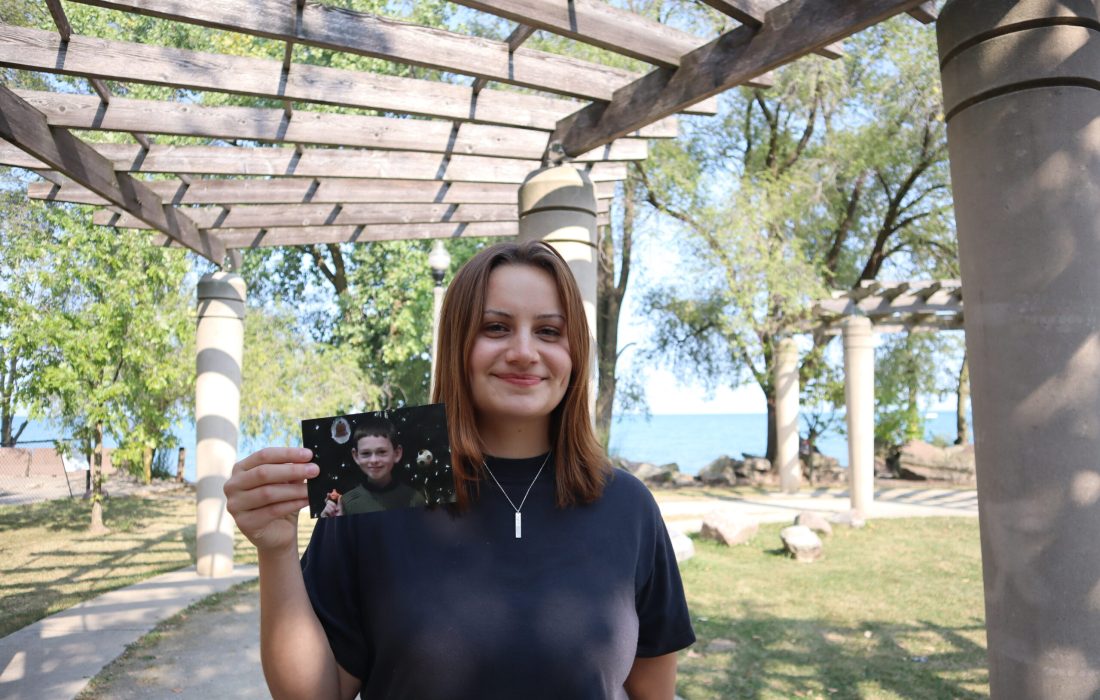Writer Faith Hug explores coping with unexpected grief amidst personal change at college.
Navigating Grief on the College Campus
It seems fitting that in one of the most hellish landscapes imaginable — the School of Communication basement — I received the worst news of my life.
“Are you sitting down?” my dad asked. I was sitting, uncomfortably, in a high top chair sandwiched between the snaking corridor’s yellow walls.
“We lost him.”
The usual oppressiveness of the basement’s fluorescent lights were multiplied tenfold as streams of salty tears stung my eyes.
Earlier that February morning, my mom informed my brothers and I our sister Anna’s husband, Matthew, had a possible brain aneurysm. His chances of survival were reduced to heartbreaking figures.
After my mom broke the news, my dorm room became an island and I assumed the role of panicked, wailing seagull circling it.
I sat in my island’s solitude because I didn’t know how to confront my Mertz Hall neighbors with unanswerable questions like, “What should I do if my brother is dying 350 miles away and I have class in an hour but I can’t focus on anything other than the fact that my brother is possibly dying?”
I figured people who need instructions on how to do their laundry wouldn’t have the answer to such a question at 8:30 a.m.
After a flurry of hospital visits, funeral services and commutes between Illinois and Iowa, I returned and was shocked to discover while my life was upended, the rhythm of campus remained steady.
Students shuffled to class, dining hall plates filled and emptied, skirts were brought out for weekend nights. Nothing shook due dates from calendars or jolted laughing friends off beachside rocks.
The persistence of routine seemed to mock my halted emotional state. In a somber, anxious haze, I felt misaligned with the thrum of daily life.
Solitude became a convenient place to sit with racing thoughts and squabbling emotions.
As it turns out, the supposed stages of grief were less like a yellow brick road to the destination of acceptance, and more like a tornado of sadness, frustration, nostalgia and appreciation. This crude “The Wizard of Oz” analogy not yet formed in my lexicon, I struggled to communicate my wants, needs and thoughts to others at Loyola.
Most didn’t seem to know how to talk to me about my grief after the expected “I’m here for you if you need anything.”
Even now, any mention of Matthew I make — about either the loss or the life of him — tends to kill the flow of conversation, often leading to topic redirections or weighty silence.
I say this not to shame or blame anyone. Grief manifests differently in everybody, so tailoring responses to each individual’s experience proves an incredibly precarious task. This difficulty is exacerbated when one doesn’t have personal exposure to or comprehensive education on grief. I can’t fault people for inexperience.
In the weeks following the death of my brother-in-law, I struggled with the dread of being removed from anyone who was able to truly comprehend my loss — not just my grief, but the loss of Matthew.
How could anyone understand this devastation if they had never looked into his kind eyes, or felt his warm hug or knew his chuckle? If they were never familiar with his triumphant board game skills, passion for music or unwavering kindness, how could they ever empathize?
As such questions left me feeling isolated on campus, I became hyper-aware of the distance between my family and I. The physical space separating us was incompatible with the emotional closeness demanded by shared loss. Living just a combined Red Line ride and bus trip away from my brother and his girlfriend was a saving grace during the most turbulent days.
My family’s ability to digitally communicate through our grief with humor and openness is a gift I don’t take for granted. I credit my sister’s resilience, hope and honesty as a guide for us all.
Still, knowing I couldn’t be with those I love most as they faced immense pain was anguishing and often inspired ill-timed tears. I’m sure there are people from my theology class who still think I was just really upset over Buddhism.
In my grief, I’ve learned to avoid resenting others’ inability to understand my loss and focus on sharing the overwhelming goodness of my brother’s character with those not lucky enough to have known him. I love to talk about him and am thankful for friends who give me the opportunity to do so.
As I readjusted to campus life in the weeks following Matthew’s death, I realized I couldn’t compartmentalize my grief. There’s never any good time to process loss, and the task is never completed.
Being thrust back into mundanity, however difficult, taught me I had to find ways to incorporate the memory of Matthew into each day — with tears or with smiles, with a story about him or a call to my family. I just have to process it everyday.
I find reminders of him all over campus — frisbee throws on the quad, the tight hug of a friend, a soft breeze off the lake. Sometimes these make me smile, sometimes they make me cry and sometimes they elicit both at the same time. Regardless, campus is truly becoming a more beautiful place as I learn to look for reflections of Matthew’s joy, care and compassion.
His light lives on in everyone he met and in his daughter Evelyn, born in May. I try everyday to lead with the same wise heart he led life with and hope everywhere I go — yes, even the dank School of Communication basement — I’m able to view the world through Matthew’s eyes.
-

Faith Hug is a second-year studying multimedia journalism and anthropology. Since joining The Phoenix in her first semester, she’s contributed to both the arts and opinion sections with features about the local community and reviews of movies, music and stage shows. She can often be found people-watching, dancing or wowing her loved ones with barely passable celebrity impressions.
View all posts
Topics
Get the Loyola Phoenix newsletter straight to your inbox!


